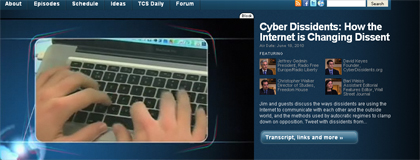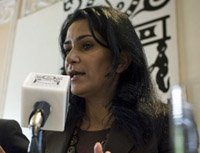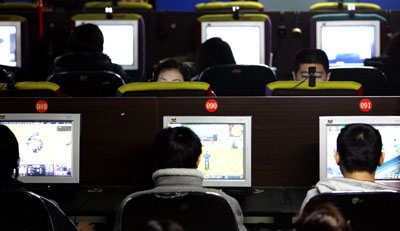Asia
2010
Freed Sri Lankan journalist Tissainayagam arrives in U.S.
New York, June 19, 2010—The Committee to Protect Journalist welcomes the arrival in the United States of Sri Lankan journalist J.S. Tissainayagam, who arrived at Washington’s Dulles International Airport on Saturday morning. He was met there by friends. According to CPJ representative Kamel Labidi, who was on hand to meet Tissa, “He was all smiles,…

As dissidents move online, governments fight back
Social media and cyber dissidents have exerted a increasing influence on global politics over the last few years—Twitter, for instance, was widely utilized by protesters and journalists during Iran’s 2009 post-election Green Movement, and China has been locked in conflict with Google over allegations of censorship and hacking. “Ideas in Action” with Jim Glassman, a half-hour weekly show on…
Thailand responds to CPJ about recent attacks on the press
Thailand’s Washington-based embassy issued an official reply to CPJ’s June 7 letter addressed to Prime Minister Abhisit Vejjajiva in which we expressed our concerns about the country’s deteriorating security situation for journalists. CPJ’s letter highlighted in particular our concerns about two journalists—Reuters cameraman Hiro Muramoto and freelance photographer Fabio Polenghi—who were killed while covering recent clashes between anti-government protestors and security forces.

Living in limbo: The ongoing wait of journalists in exile
The e-mails started on July 15, 2009, and have continued ever since—pleas for help from Iranian journalists who fled their country often with little money and scarce provisions to northern Iraq, Turkey, Afghanistan, India, and a host of other locales around the world. Many lived in hiding throughout Iran for weeks or months before crossing perilous borders…
Another radio journalist killed in the Philippines
New York, June 16, 2010–Philippine radio commentator Joselito Agustin was fatally shot by two motorcycle riding assailants while heading home from work late Tuesday evening near Baccara town in the northern Philippines, according to local and international news reports. The murder occurred just one day after the murder of radio journalist Desidario Camangyan in southern…

Cano laureates say no to UNESCO Obiang prize
Each year, UNESCO honors a courageous international journalist with the UNESCO/Guillermo Cano World Press Freedom Prize, named in honor of the Colombian editor murdered in 1986 by the Medellín Cartel. The prize is chosen by an independent jury and over the years I’ve attended several moving ceremonies in which some of the most daring journalists…
CPJ seeks justice in murders of Philippine journalists
Dear President-elect Aquino: With your recent election to office, we are looking forward to engaging with your administration on press freedom-related issues in the years ahead. It is our particular hope that you will translate your strong electoral mandate into a firm commitment to end the culture of impunity that has resulted in the extraordinarily high number of media killings in the Philippines.
The malware lockdown in Havana and Hanoi
General purpose computers give journalists an incredible amount of power to create, research, and publish their work away from those who may wish to interfere. But such independence requires that the computer itself remain free and uncompromised by software that works against the journalist’s own interests.

China’s future online policies look a lot like past plans
Monday, in a white paper released by China’s State Council called “The Internet in China,” the government made clear its Internet policies are not changing, stating the obvious: “Laws and regulations clearly prohibit the spread of information that contains content subverting state power, undermining national unity [or] infringing upon national honor and interests.” The State…